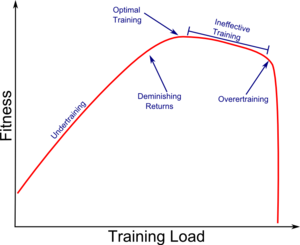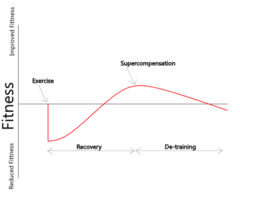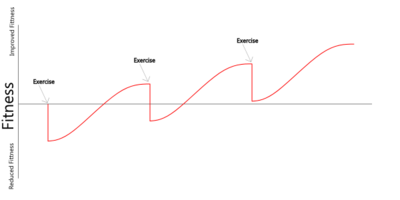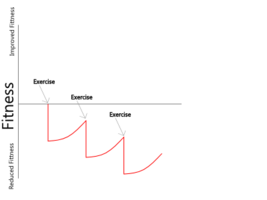Difference between revisions of "Overtraining"
From Fellrnr.com, Running tips
User:Fellrnr (User talk:Fellrnr | contribs) m |
User:Fellrnr (User talk:Fellrnr | contribs) |
||
| Line 1: | Line 1: | ||
| − | [[File:Training Benefit.png|right|thumb|300px|As training load increases there is an initial rapid improvement in fitness. Further increases produce diminishing returns until a | + | [[File:Training Benefit.png|right|thumb|300px|As training load increases there is an initial rapid improvement in fitness. Further increases produce diminishing returns until a optimum training is reached. Further training beyond this point produces less than optimal results until overtraining is reached when fitness is dramatically diminished.]] |
Overtraining is a lack of recovery from training stress. The most serious type of overtraining is [[Overtraining Syndrome]], but there are other categories. Each involves some imbalance between training and recovery, but with different outcomes. All levels of runner can experience any of the types of Overtraining, including [[Overtraining Syndrome]]. | Overtraining is a lack of recovery from training stress. The most serious type of overtraining is [[Overtraining Syndrome]], but there are other categories. Each involves some imbalance between training and recovery, but with different outcomes. All levels of runner can experience any of the types of Overtraining, including [[Overtraining Syndrome]]. | ||
* '''[[Overtraining Syndrome]]''' is where the imbalance between training and recovery produces a decrease in performance and negative psychological changes. The negative effects of overreaching do not produce overall performance improvements through [[Supercompensation]]. ''(Main article: [[Overtraining Syndrome]].)'' | * '''[[Overtraining Syndrome]]''' is where the imbalance between training and recovery produces a decrease in performance and negative psychological changes. The negative effects of overreaching do not produce overall performance improvements through [[Supercompensation]]. ''(Main article: [[Overtraining Syndrome]].)'' | ||
Latest revision as of 18:34, 13 April 2012

As training load increases there is an initial rapid improvement in fitness. Further increases produce diminishing returns until a optimum training is reached. Further training beyond this point produces less than optimal results until overtraining is reached when fitness is dramatically diminished.
Overtraining is a lack of recovery from training stress. The most serious type of overtraining is Overtraining Syndrome, but there are other categories. Each involves some imbalance between training and recovery, but with different outcomes. All levels of runner can experience any of the types of Overtraining, including Overtraining Syndrome.
- Overtraining Syndrome is where the imbalance between training and recovery produces a decrease in performance and negative psychological changes. The negative effects of overreaching do not produce overall performance improvements through Supercompensation. (Main article: Overtraining Syndrome.)
- Overtraining Syndrome Subtypes. There are various ways of categorizing Overtraining Syndrome. One division is based on recovery time, with recovery in two weeks or less being called 'Overreaching' (AKA non-functional overreaching[1][2] and 'Overtraining Syndrome' (OTS) requiring several weeks[1], or months[2] and sometimes years[3]. Other categorizations use the associated mental health impacts of Overtraining Syndrome.
- Too Much Too Soon (TMTS) is different to Overtraining Syndrome, but it is related. Too Much Too Soon is where a new training stress is increased too quickly, combined with too little recovery causing injuries, but without the impaired performance, persistent fatigue, and mood changes of Overtraining Syndrome. (Main article: Too Much Too Soon.)
- Overuse is similar to TMTS, but is where a long term imbalance between training and recovery leads to injuries. Like TMTS, overuse does not have the mood changes that are indicative of Overtraining Syndrome. With Overuse passive recovery is often insufficient. (Main article: Overuse.)
- Overload is a normal part of healthy, effective training. Overload has a short term performance decrement, but without the severe psychological and long lasting negative symptoms of Overtraining Syndrome[2]. Overload is sometimes called 'functional overreaching'. Overload can be recovered from in a few days[1].
1 Overtraining and Supercompensation
2 References
- ↑ 1.0 1.1 1.2 Physiological Perspective of Endurance Overtraining – A Comprehensive Update http://ajms.alameenmedical.org/article_vol05-1-jan-mar-2012/AJMS.5.1.2012%20P%207-20.pdf
- ↑ 2.0 2.1 2.2 Prevention, diagnosis and treatment of the Overtraining Syndrome http://www.ingentaconnect.com/content/tandf/tejs/2006/00000006/00000001/art00001
- ↑ The unknown mechanism of the overtraining syndrom... [Sports Med. 2002] - PubMed - NCBI http://www.ncbi.nlm.nih.gov/pubmed/11839081


